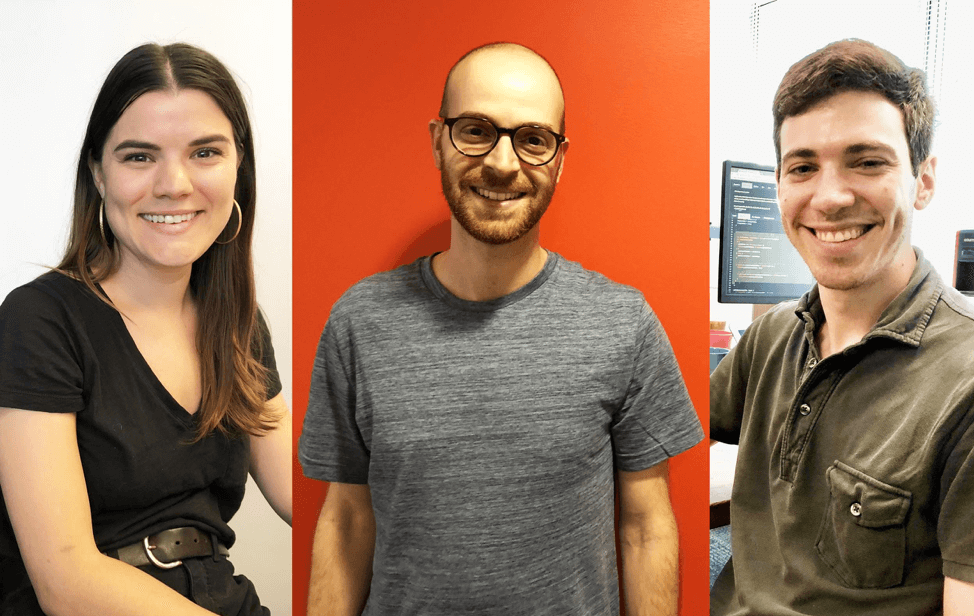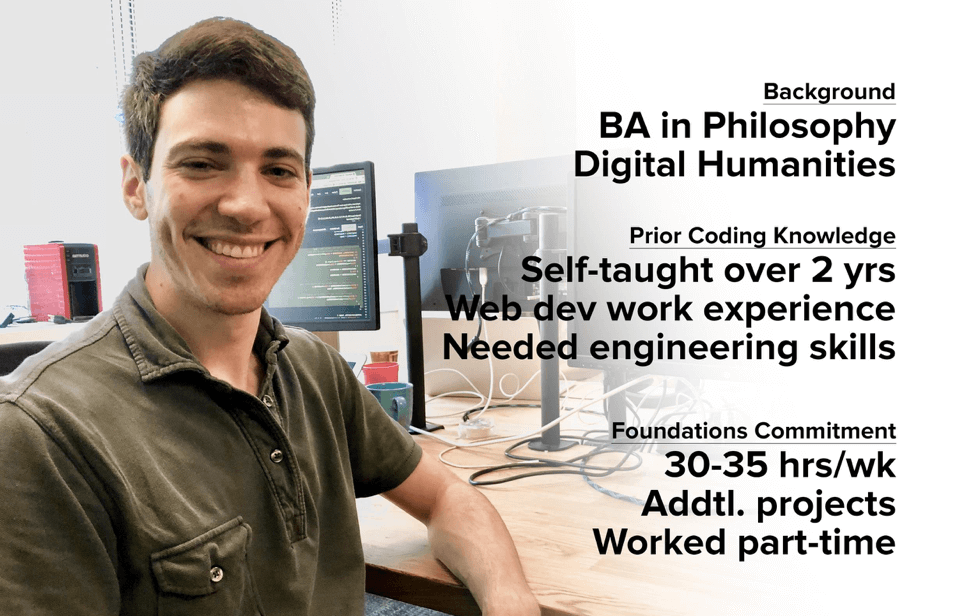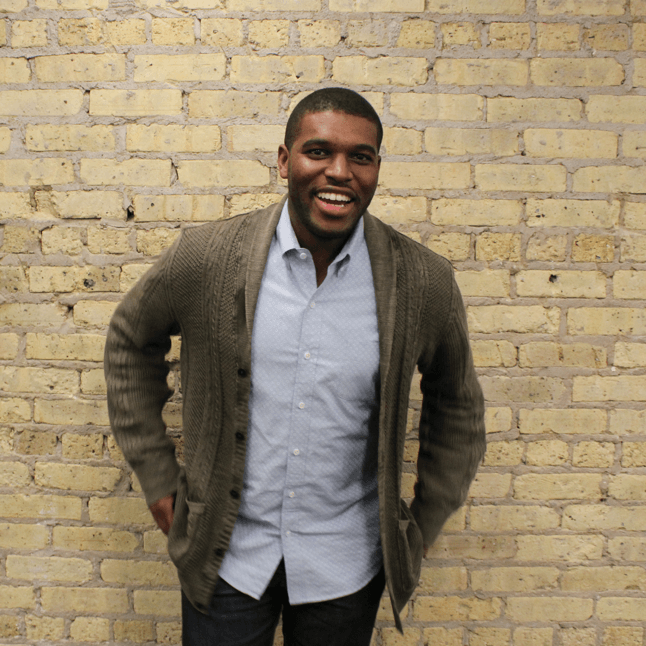Figuring out Foundations
By: Emily Rose Prats, Content Marketer at Fullstack Academy
If you've been researching bootcamps, you've probably seen pictures of students on campus, so it's easy to imagine yourself there. But what about the work that happens off-campus? That can be a lot harder to wrap your head around, especially when off-campus learning is your first taste of a bootcamp--like it is at Fulltsack Academy.
Their 17-week Software Engineering Immersive begins with a part-time remote phase called Foundations that lasts four weeks and is intended to make sure all students are equally prepared to begin the on-campus portion of the program. We sat down with three program grads to talk about their Foundations experiences and help you understand what the program entails.

Ben Ellentuck
Fullstack Academy gradWhat was your background & level of coding experience before Fullstack?
- I have a BA in philosophy
- I got into coding at the end of 2015, first in data science, and I was teaching myself for about a year
- Then I found a role in digital humanities, which basically meant developing various websites for university programs, things like that, and I did that for another year
- That means I was doing a lot of web development, but I didn't actually know anything about engineering
- Initially, my plan was to go back to school and get a second degree, but after I did my research, I realized bootcamp was much more efficient way of getting where I needed to go
JavaScript had been really intimidating for me. It wasn't like any other language I had studied, so I had really high expectations of Foundations, which were basically to make me 100% comfortable in JavaScript--and it definitely did.
How much time each week did you spend on Foundations material?- I basically treated Foundations like a full-time job
- I knew that putting extra time in was going to mean the difference between my having a sufficient understanding of the concepts and a deep understanding of the concepts
- I also spent a lot of time reading documentation and practicing Codewars problems, which is not required, but which was my choice
- Ultimately, the amount of time it requires of you will depend on your goals within the program & your prior experience
Yep, I worked part-time as barista
"Checkpoints" are the assessments students take throughout each phase of the Fullstack program to measure progress. How confident did you feel going into the Foundations checkpoints?- I always felt prepared
- I would have been surprised if I hadn't done well because had taken it upon myself to practice the assessments repeatedly--so instead of just saying "I understand this intellectually," I practiced building, debugging, and solving other problems in a set amount of time, the way you have to do for a checkpoint
- It was really useful
- I used the project to learn more about CSS and jQuery, both of which I knew would not be large parts of the Fullstack curriculum once Foundations was over, so I took the time to get familiar with them then
- The Foundations forum was super helpful
- Some of the best resources I've ever come across were shared in that forum by other Foundations students, so I loved that I was able to pick up from fellow students even more than what I was learning from the curriculum
- I didn't really use the mentor after our initial call. I felt like mentors were mostly for people who were really struggling
- Be prepared for Foundations to focus less on the specific stack you'll be learning in the on-campus immersive and more on getting comfortable with all the kinds of technologies available to you in the industry
- That's important--so that if you get hired somewhere that doesn't use exactly the stack you're familiar with, you won't be out of your depth
- The point of Foundations is to show you how you can go from basic building-blocks to more sophisticated objects
- It's teaching you how to think about solving problems, and that's great

Rachel "Rocky" Fine
Grace Hopper Program gradWhat was your background & level of coding experience before Grace Hopper?
- I had taken basic online courses in HTML, CSS, and JavaScript, but otherwise didn't really understand what I was doing
- I was working in a totally non-tech field before Grace Hopper--having to do with social work and education--and I was getting burnt out
- So when I started considering a change, I took into account that I had always loved math & logic--and it just so happened my roommates were going to coding bootcamp, so I looked into it
- I loved that Grace Hopper involved so little risk: you don't pay full tuition until you get a job in software engineering
- So I tried the JavaScript 101 class and loved it, then took Bootcamp Prep Online, and then I was accepted
- I knew it would be part-time and remote, and since I'd only done online classes, that structure was very comfortable for me
- What I didn't realize was that so much of the curriculum would be recorded video (I was used to live instruction even in online classes), so I took full advantage of the discussion forum as a chance to get real-time feedback
- At first I was intimidated to ask questions (I didn't want to look silly), so I loved that feature where you could jump onto a thread or into a live chat with other students who'd already asked a question similar to one I had
- I stayed with my mom for Foundations, so I could save on rent
- Initially I planned to work remotely full-time for the employer I was leaving, but I saw right away that wasn't going to leave me enough time to learn
- I scaled back to part-time, and since it was remote, I didn't have to worry about commuting or the emotional element of being in the office, and could concentrate fully on Foundations
- It varied week to week, depending on how comfortable I was with the concepts
- Generally 20-30 hrs/week
- I was very nervous going into the first checkpoint, but I did well because it didn't go into too much detail on the concepts I wasn't as strong on (closure and recursion specifically)
- Then I sort of got a false sense of security and so of course the second checkpoint didn't go as well because it did incorporate more of the concepts I was struggling with
- So then I was especially nervous for the final checkpoint, so I did a ton of prep and did just fine
- Honestly, though, I trusted that the curriculum had given me what I needed to prepare, so as long as I was using all the resources and truly understanding, there wouldn't be any huge surprises
- It was the first time I'd ever actually built something with my coding skills, so that was cool
- But in order to do the project, we did have to use some concepts we hadn't yet learned, so it was also a little discouraging that I felt like I still didn't really know enough to build something
- It just goes to show that you have to work really hard to even learn the very basics, and you're not going to magically be an impressive developer in just a few weeks, and that's why the whole Grace Hopper program is 17 weeks, not just four.
- I loved being paired with a mentor for the program
- It was really helpful to be able to get direct feedback about my code
- It was also important just to know someone was there for me when I needed support, and I wasn't all alone in either my struggles or my successes
- The Fullstack discussion forum was particularly helpful because I didn't always know what I didn't know, so seeing what other students were asking helped me pinpoint my own challenges and my own strengths
Give yourself time. You're not going to fully understand any concept, no matter how low-level, in in two hours. Give yourself time not just to read the materials and do a workshop, but to keep practicing on different problems and combining concepts in new ways. Give yourself more time than you think you need.
Learn more about Rocky on LinkedIn
Yoni Slotwiner
Fullstack Academy gradWhat was your background & level of coding experience before Fullstack?
- I had about four months of independent learning under my belt, which means I essentially knew the basics and not much more
- I was working as a customer support/program manager at Uber
- I had a little SQL experience from that job, but that was about it
- I took the Bootcamp Prep course to get myself ready for the admissions assessment
I had very little experience coding, so I intentionally quit my job a couple of weeks before starting Foundations to give myself all the time I would need to learn
How much time each week did you spend on Foundations material?- I spent about 30 hrs/week on the curriculum
- But I also put in additional hours outside of the program -- for example, I had a book & would go over the basics independently
- I get nervous for exams, no matter what
- I felt like as long as I'd done the work, I'd be fine on the checkpoints
- Nothing on the exams was ever a surprise or something we hadn't covered
- I absolutely loved the project
- I felt like I'd learned a bunch of concepts, but hadn't yet gotten to use them in a practical way
- And the videos are great, but we'd been learning in that same style for a whole month, so switching it up with the project was awesome
- It was the first app I'd ever made, so it gave me a confidence boost and was just plain fun
- At first, it didn't seem like I'd end up getting too much use out of the mentorship program
- We had an initial call and I got some feedback from him, but that was pretty much it
- But then when I started my job search, we ended up reconnecting for networking purposes
- So even though I didn't need his help with the curriculum, I need his help now, as I start my job search, so it's a good connection to have made
- This might seem obvious, but take the time to set up your machine properly
- There's even a Foundations workshop that helps you get set up, so just do it, even if it seems too basic for you
- It will come back to bite you later during the on-campus immersive, when it's crunch time on a project, if you don't go through the whole thing and do it right
- Even if that means taking extra time to get comfortable with your editor, that's the kind of little thing that'll help you be more successful in junior or senior phase
This post was sponsored by Fullstack Academy.
Want to learn more about Fullstack Academy? Check out their alumni reviews on SwitchUp.

